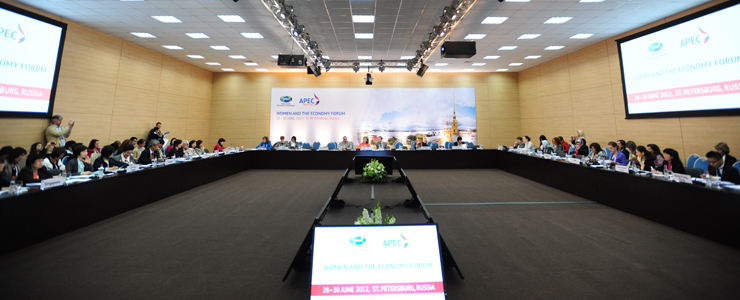
The APEC Policy Partnership on Women and the Economy (PPWE) provides a mechanism to integrate gender considerations into APEC activities. It also provides policy advice on gender issues and supports gender equality where relevant to the APEC process.
In 1998 APEC Leaders endorsed the recommendations of the first Ministerial Meeting on Women in Makati City, Philippines, and this resulted in the formation of the Senior Officials' Meeting (SOM) Ad-Hoc Advisory Group on Gender Integration (AGGI). The AGGI was tasked to assist with the implementation of the "Framework for the Integration of Women in APEC" within APEC groups, and to provide recommendations on gender integration. Its mandate expired in 2002 and Ministers then endorsed the establishment of the APEC Gender Focal Point Network (GFPN) to continue to advance the implementation of the Framework and to sustain the AGGI's achievements in maintaining awareness on gender issues.
The PPWE was established at the second Senior Officials’ Meeting in May 2011 held at Big Sky, Montana, the United States. It combined the former APEC Gender Focal Point Network (GFPN) and the private sector-oriented Women’s Leadership Network (WLN) – creating a single public-private entity to streamline and elevate the influence of women’s issues within APEC.
The PPWE effectively acts as an institutional mechanism for reporting to the SOM Steering Committee on Economic and Technical Cooperation (SCE) on APEC gender activities and outcomes. The broad goal of the PPWE is to provide linkages between APEC working groups, APEC economies and the APEC Secretariat to advance the economic integration of women in the APEC region for the benefit of all members.
At the second meeting of the PPWE in June 2012 in Saint Petersburg, Russia, members presented their Individual Action Plans (IAP) based on the four priority areas identified at the 2011 Meeting
The PPWE members also exchanged views on how best to pursue its eight tasks:
- Assist APEC groups and actively cooperate with them to identify and address priority gender equality and women and the economy issues;
- Promote and report on women’s representation across APEC and within individual groups;
- Assess the use of gender equality criteria in project proposals, reporting and evaluation;
- Collect and share best practices in gender equality integration;
- Support and report on the progress of implementation of gender integration within individual groups and across APEC economies;
- Proactively engage key members of PPWE, including private sector members and ABAC;
- Collaborate and assist in the development of project proposals in the area of women in the economy;
- Propose recommendations and areas of priority for advancing gender equality and women and the economy integration in APEC.
The PPWE Management Council Meeting expressed the need to develop its medium and long term work plans to submit to the SCE, based on the IAP submitted by a majority of the membership.
Third Policy Partnership on Women and the Economy Meeting 2013:
Individual Action Plans for Enhancement of the Ratio of Women's Representation in Leadership
| Year | Title |
| 2013 | Chinese Taipei |
| 2013 | Russia |
| 2013 | Singapore |
| 2013 | Viet Nam |
Topic-related researches:
Women and Economic Indicators
 2018 2018 |
 2017 2017 |
 2016 2016 |
 2015 2015 |
 2013 2013 |
 2012 2012 |


